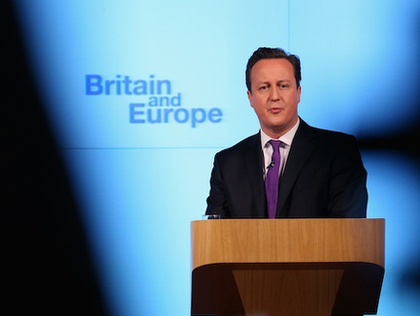Number 10 is claiming that British Prime Minister David Cameron has “won agreement” on a vote on the future president of the European Commission, the EU’s executive branch.
The claim follows a meeting in London today between Cameron and Herman Van Rompuy, president of the European Council.
However, it is hard to see how Number 10 can claim Cameron “won” anything, or that he needed to persuade Van Rompuy to secure a vote to decide who will be top eurocrat. The 2007 Lisbon Treaty ensures that a decision on the nomination of a new top man at the commission is to be made in the council by qualified majority vote (QMV).
Van Rompuy was reported this evening by the BBC “to have left the meeting to discuss when and how the vote could take place.”
However, a document circulated by Van Rompuy’s own office early today already showed the following item in the draft conclusions for the two-day council meeting starting on Thursday: “The European Council agreed on the candidate that it will propose to the European Parliament for President of the European Commission.”
Since Cameron has made it plain in recent weeks that he will fight the appointment of Juncker “to the end,” and Chancellor Angela Merkel has made it clear she does not want the wrangling over Juncker to carry on any longer, a vote at the meeting has been inevitable.
If Juncker is nominated by the council and then wins an absolute majority vote at the European Parliament, which seems certain, it will be the first time a president of the commission has been appointed against the wishes of a British prime minister.
This is because the Lisbon Treaty removed the veto power of each prime minister on the council and introduced QMV instead. The system gives weighted voting based on population. By agreeing to the Lisbon Treaty, Britain has gone from having a veto over the selection of the president of the commission to having a vote worth eight per cent of the total.
Of the 28 member states, 15 must vote in favour and they must represent 260 of the 352 total number of votes. The UK has 28 votes in the council. Germany and France have 29 each.
Under the system in effect before the Lisbon Treaty, Cameron could have done what Prime Minister John Major did in 1995 when former Belgian prime minister Jean-Luc Dehaene was the top choice to succeed Frenchman Jacques Delors as president of the commission.
Dehaene was just as much of a euro-zealot as Juncker, so Major let it be known that he was not having him as top man at the commission. Therefore the rest of the council agreed a “consensus” that a former prime minister of Luxembourg, Jacques Santer, be chosen instead.
There was no vote, all Prime Minister Major had to do was say he wasn’t having Dehaene and someone else had to be chosen that he would accept.
Cameron would still have this veto power if he had, as he guaranteed, given the British people a referendum on the Lisbon Treaty and they had rejected it. Instead he reneged on his guarantee, and now it appears he is about to be the first British prime minister ever to be humiliated over the choice of the head of the European Commission.

COMMENTS
Please let us know if you're having issues with commenting.